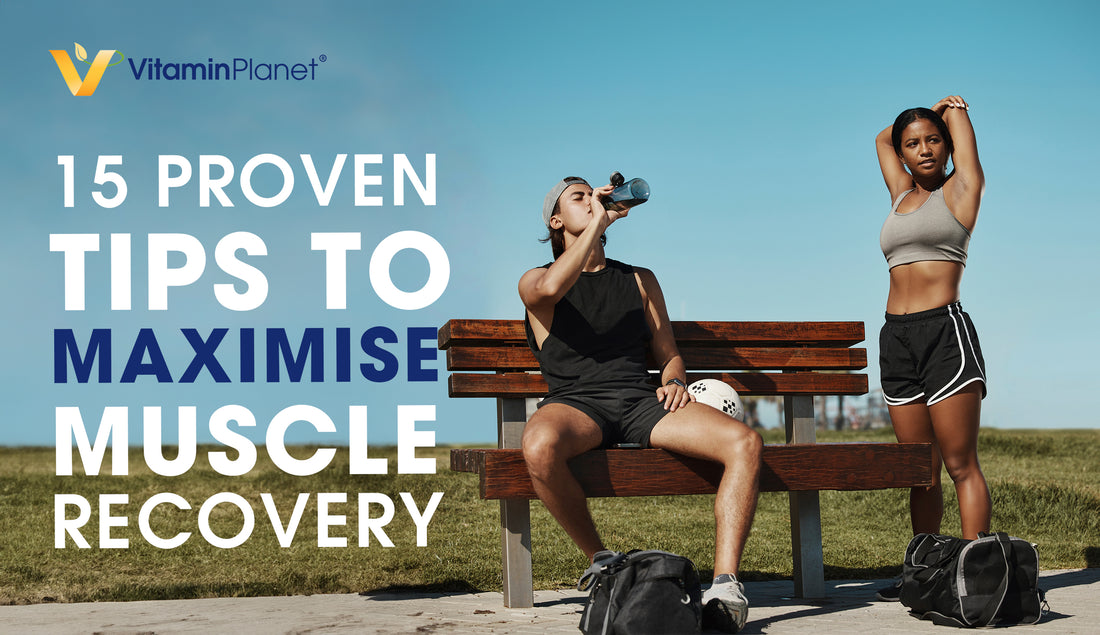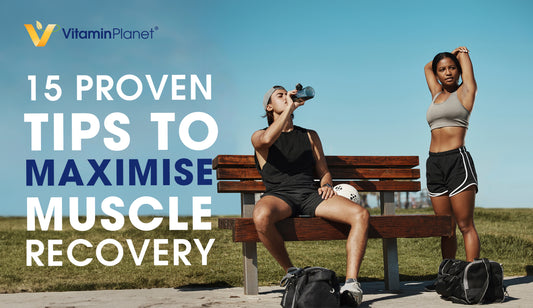Embarking on a fitness journey is not just about hitting the gym hard; it's a holistic approach that involves nurturing your body inside and out.
While recovery methods abound, nothing can compensate for the absence of a nutritious diet and adequate rest.
In this comprehensive guide, we unveil 15 proven tips that will not only enhance your muscle recovery but also pave the way for a steadfast fitness routine.
Revatilise Your Nutrition:
1 - Post-Workout Protein Powerhouse:
As you push your body during exercise, your muscle fibers undergo damage. Fuel their recovery by consuming 20 to 40 grams of protein post-workout, providing the essential raw materials for repair and growth.
2 - Pre-Workout Protein Boost:
Elevate your muscle protein synthesis by incorporating protein into your pre-workout routine. Research suggests an optimal amount of 0.4 to 0.5 g/kg of body weight for enhanced performance.
3 - Carbohydrates for Rapid Recovery:
Restore glycogen levels swiftly after intense workouts by consuming 1.2 g/kg of body weight per hour, focusing on high-glycemic-index carbohydrates like white rice and potatoes.
4 - Embrace a Balanced Diet:
Ensure a well-rounded, healthy diet by minimising ultra-processed foods, increasing fruit and vegetable intake, and meeting protein requirements of 1.4 to 1.8 grams per kilogram of body weight.
Hydration and Drinks:
5 - Hydrate for Success:
Don't underestimate the power of hydration. Drink 16 to 24 ounces of fluid for every pound lost during exercise to prevent dehydration, especially in hot or humid conditions.
6 - Tart Cherry Elixir:
Discover the potential benefits of tart cherry juice, known to reduce inflammation and muscle soreness post-exercise. A daily dose of 480 milliliters may be the secret to enhanced recovery.
Supplements for Added Boost:
7 - Creatine Monohydrate Magic:
Backed by extensive research, creatine monohydrate stands out as a supplement that not only improves muscular strength but aids in recovery by reducing muscle damage and inflammation.
8 - Protein Powder Convenience:
Conveniently augment your protein intake with protein powder, featuring essential amino acids. Whey and collagen powders are popular choices for a complete spectrum.
Lifestyle Enhancements:
9 - Prioritise Sleep:
Give your muscles the recovery time they deserve by ensuring an adequate amount of sleep. Quality rest facilitates the body's inflammation reaction and supports hormone production for optimal muscle growth.
10 - Massage for Relief:
Integrate massage into your routine to alleviate muscle soreness. Studies suggest a small but significant effect on flexibility and reduced delayed onset muscle soreness.
11 - Embrace Compression Garments:
Explore the benefits of compression garments, as seen in a study lowering muscle recovery time in athletes. Consider incorporating them strategically into your recovery routine.
12 - Contrast Water Therapy:
Experience the potential benefits of contrast bath therapy, alternating between warm and cold water to stimulate blood vessel activity and heart rate changes, ultimately reducing muscle soreness.
13 - Harness the Power of Cryotherapy:
Expose your body to extreme cold temperatures through cryotherapy to accelerate recovery by diminishing pain, inflammation, and muscle fatigue.
Avoid Detrimental Habits:
14 - Say No to Alcohol:
Ditching alcohol is crucial for muscle recovery, as it impairs glycogen replenishment and inhibits protein synthesis.
15 - Quit Smoking:
Smoking negatively impacts the musculoskeletal system, increasing the risk of muscular injury, joint disease, and bone fractures.
Understanding Muscle Recovery Time:
Discover the nuanced timeline of muscle recovery, influenced by factors like workout intensity, duration, and overall fitness levels.
Learn why giving your body the necessary time to recuperate is crucial to preventing injuries.
Preventing Injury During Recovery:
Understand the importance of gradual increases in intensity and volume to prevent injury or overtraining.
Explore strategic workout scheduling, allowing alternating muscle groups to recover fully before the next session.
Complications of Insufficient Recovery:
Delve into the potential risks of inadequate recovery, from muscle strains to compromised athletic performance. Recognise the signs indicating the need for extended recovery periods.
The Ultimate Takeaway:
Whether you're a fitness enthusiast or a competitive athlete, the key to maximising muscle recovery lies in embracing a healthy diet and prioritising quality sleep.
No recovery technique can compensate for neglecting these foundational elements. Elevate your fitness journey by adopting these evidence-based strategies for a vibrant and resilient body.









